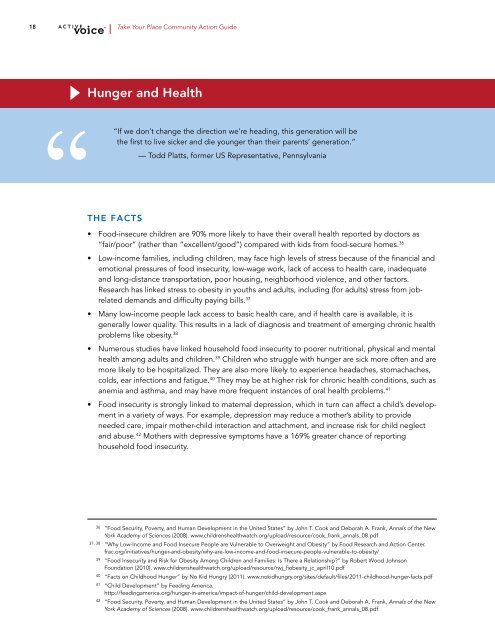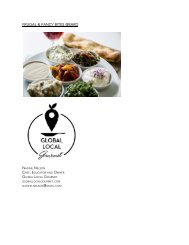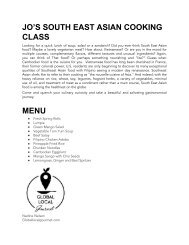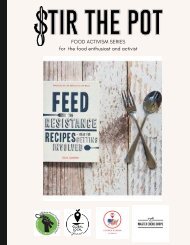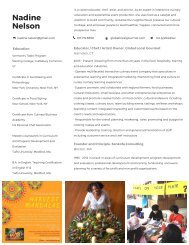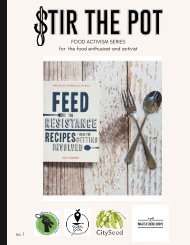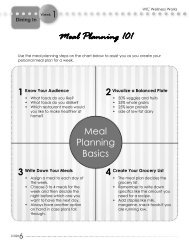APATT_CommunityActionGuide
Create successful ePaper yourself
Turn your PDF publications into a flip-book with our unique Google optimized e-Paper software.
18 Take Your Place Community Action Guide<br />
“If we don’t change the direction we’re heading, this generation will be<br />
the first to live sicker and die younger than their parents’ generation.”<br />
‘‘Hunger and Health<br />
The Facts<br />
— Todd Platts, former US Representative, Pennsylvania<br />
• Food-insecure children are 90% more likely to have their overall health reported by doctors as<br />
“fair/poor” (rather than “excellent/good”) compared with kids from food-secure homes. 36<br />
• Low-income families, including children, may face high levels of stress because of the financial and<br />
emotional pressures of food insecurity, low-wage work, lack of access to health care, inadequate<br />
and long-distance transportation, poor housing, neighborhood violence, and other factors.<br />
Research has linked stress to obesity in youths and adults, including (for adults) stress from jobrelated<br />
demands and difficulty paying bills. 37<br />
• Many low-income people lack access to basic health care, and if health care is available, it is<br />
generally lower quality. This results in a lack of diagnosis and treatment of emerging chronic health<br />
problems like obesity. 38<br />
• Numerous studies have linked household food insecurity to poorer nutritional, physical and mental<br />
health among adults and children. 39 Children who struggle with hunger are sick more often and are<br />
more likely to be hospitalized. They are also more likely to experience headaches, stomachaches,<br />
colds, ear infections and fatigue. 40 They may be at higher risk for chronic health conditions, such as<br />
anemia and asthma, and may have more frequent instances of oral health problems. 41<br />
• Food insecurity is strongly linked to maternal depression, which in turn can affect a child’s development<br />
in a variety of ways. For example, depression may reduce a mother’s ability to provide<br />
needed care, impair mother-child interaction and attachment, and increase risk for child neglect<br />
and abuse. 42 Mothers with depressive symptoms have a 169% greater chance of reporting<br />
household food insecurity.<br />
36 “Food Security, Poverty, and Human Development in the United States” by John T. Cook and Deborah A. Frank, Annals of the New<br />
York Academy of Sciences (2008). www.childrenshealthwatch.org/upload/resource/cook_frank_annals_08.pdf<br />
37, 38 “Why Low-Income and Food Insecure People are Vulnerable to Overweight and Obesity” by Food Research and Action Center.<br />
frac.org/initiatives/hunger-and-obesity/why-are-low-income-and-food-insecure-people-vulnerable-to-obesity/<br />
39 “Food Insecurity and Risk for Obesity Among Children and Families: Is There a Relationship?” by Robert Wood Johnson<br />
Foundation (2010). www.childrenshealthwatch.org/upload/resource/rwj_fiobesity_jc_april10.pdf<br />
40 “Facts on Childhood Hunger” by No Kid Hungry (2011). www.nokidhungry.org/sites/default/files/2011-childhood-hunger-facts.pdf<br />
41 “Child Development” by Feeding America.<br />
http://feedingamerica.org/hunger-in-america/impact-of-hunger/child-development.aspx<br />
42 “Food Security, Poverty, and Human Development in the United States” by John T. Cook and Deborah A. Frank, Annals of the New<br />
York Academy of Sciences (2008). www.childrenshealthwatch.org/upload/resource/cook_frank_annals_08.pdf


